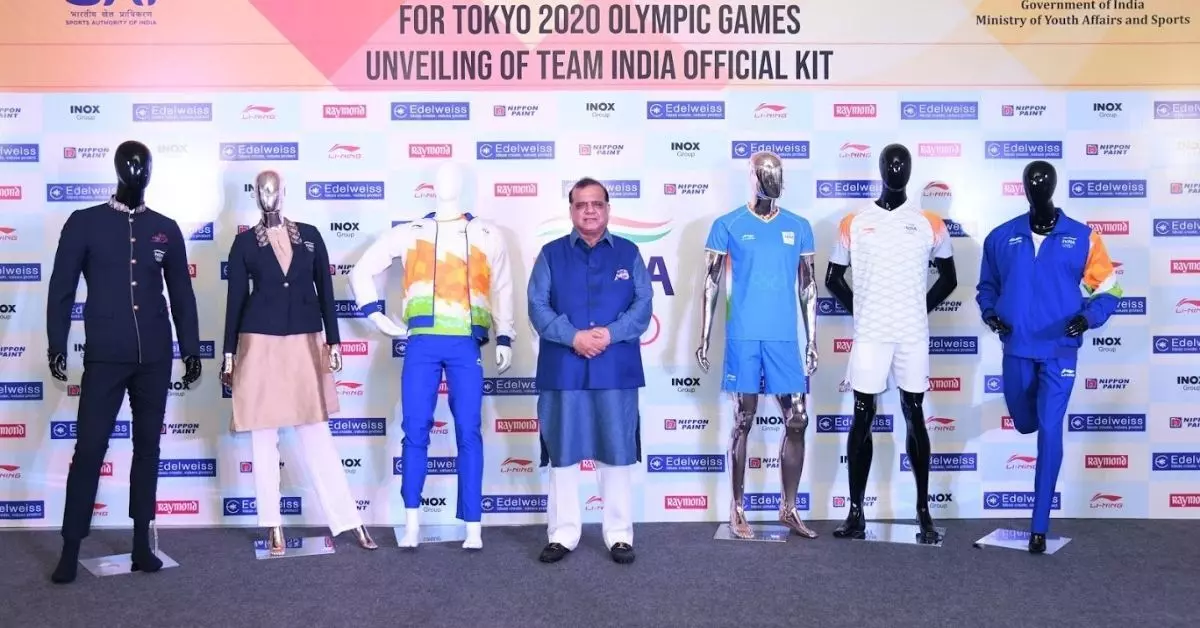Tokyo 2020
India boycotts Chinese brand ahead of Tokyo Olympics - Why this hypocrisy?
Days after unveiling new kits for the Tokyo Olympics, the Indian Olympic Association (IOA) on Tuesday decided to drop Chinese sportswear Li Ning as its official kit sponsor for the Olympics. Is this even a priority?

The IOA had unveiled the Olympic kit designed by Li Ning for the Tokyo Games last week
Days after unveiling new kits for the Tokyo Olympics, the Indian Olympic Association (IOA) on Tuesday decided to drop Chinese sportswear Li Ning as its official kit sponsor for the Olympics and decided that the country's athletes will wear unbranded apparel during the Tokyo Games scheduled to be held from July 23 to August 8. The IOA had unveiled the Olympic kit designed by Li Ning for the Tokyo Games last week, which led to criticism.
It has been learned that the Sports Ministry then advised IOA to not include a Chinese sponsor for the Games. "We are aware of the emotions of our fans, and we in a IOA have decided that we will withdraw from our existing contract with an apparel sponsor," IOA president Narinder Batra and secretary-general Rajeev Mehta said in a statement. "Our athletes, coaches and support staff, will wear unbranded apparel."
Why is the call to boycott Chinese product simply childish?
There have been calls for boycott of Chinese products since tension had increased at the LAC between the Indian army and Chinese troops last year. "We are thankful for guidance by the Ministry of Youth Affairs and Sports in making this decision," Batra and Mehta said.
Does that mean the Sports Ministry was not aware of the decision to chose Li Ning, a Chinese company, as the official kit sponsor for the Indian Olympic team? With just a month to go for the Games, why is the debate over team jersey brand taking the centre stage when the athletes and their well-being, training, and preparations could be the matters of focus before an Olympics being hosted in a challenging period of COVID 19?
Individual sports players also endorse brands possibly without knowledge that they are funded by China. India's badminton champion PV Sindhu is sponsored by Li Ning, for all the gears and equipment she use? Does it also mean Sindhu also has to change her equipment for the Olympics? BBK Electronics' IQOO, a smartphone brand appointed Virat Kohli as their brand ambassador in February 2020.
According to the Ministry of Commerce & Industry's Export Import Data Bank, commodities worth Rs 91,872.59 lakh were imported from China from April 2019 to February 2020 under the head of "Artcles and equipment for gymnastics, athletics, other sports (incl table tennis)/outdoor games." The total import for the same head and period was ₹ 139,912.07 lakh. China accounted for over 65% of that market. A distant second was Japan (Rs 11,588.51 lakh). The growth of Chinese imports in Indian sports market has been rapid. From Rs 59,434.58 lakh in 2014-15 to Rs 107,514.25 lakh in 2018-19, according to the ministry's data. That's an over 80 per cent rise in just five years.
DoTA 2 is a popular esports title that held its annual competition The International (TI), in China in 2019. Three of the eight teams who have won TI are from China. For avid players of the game, it is noticed that compared to most countries, China has more than 2 servers available whereas India and other Asian countries are grouped under a single South East Asia server. Chinese fans of DoTA 2 often flock to The International in huge numbers and are a visible fan base that renders the rest of South East Asia under an umbrella term. Call of Duty Mobile, the mobile version of the popular PC shooter game is developed by TiMi which is a subsidiary of Tencent.
Esports isn't the only field affected by Chinese investments. Many of India's sports are funded by Chinese indirectly. China is back at the Indian Premier League (IPL). Dream 11, the title sponsor for Indian Premier League, has substantial investment from Chinese conglomerate Tencent. Notably, Vivo, the previous title sponsor, had walked away from the T-20 tournament last year citing rampant negative sentiments against Chinese companies in the wake of deadly clashes between Indian and Chinese forces in Galwan valley back in May.
Tencent had invested $100 million in Dream11 for a majority stake in the fantasy cricket league platform as part of the latter's Series D funding in September 2018. While the companies hadn't declared the quantum of stake this investment amounted to, reports claimed that Tencent had acquired 10 per cent stake in Dream11. IPL teams are also backed by Chinese companies in some way, with Alibaba holding 23% stake in Zomato, a sponsor of Royal Challengers Bangalore.
Despite all the sentimental craze, the Indian sports market cannot write off Chinese elements from its ecosystem. Then what is the point of such hypocrisy where LiNing is being dropped as India's official kit sponsors, where they had offered top-notch quality?
